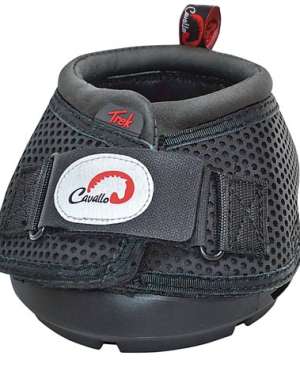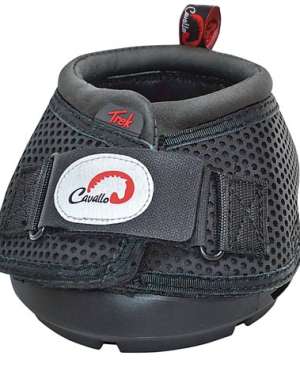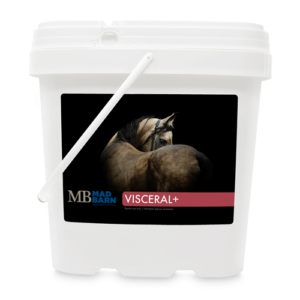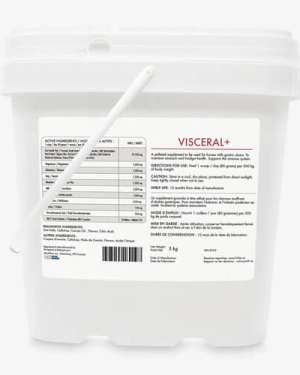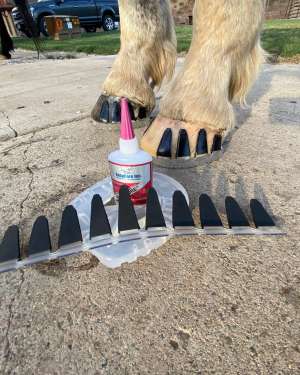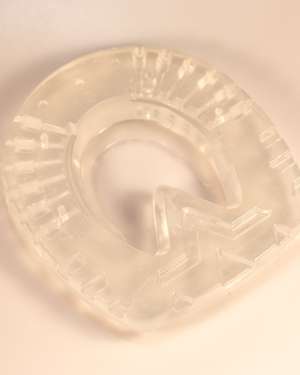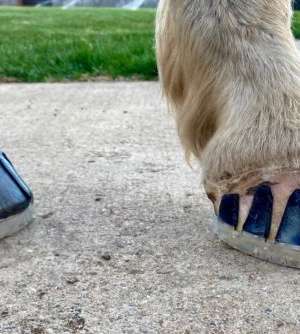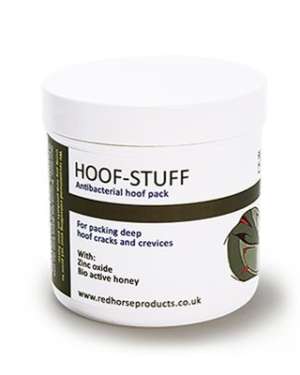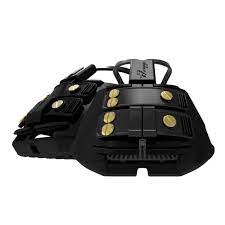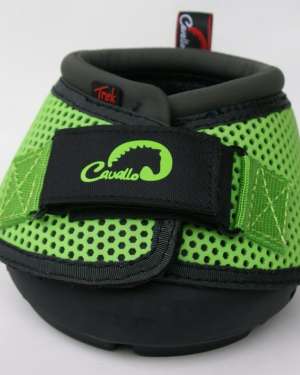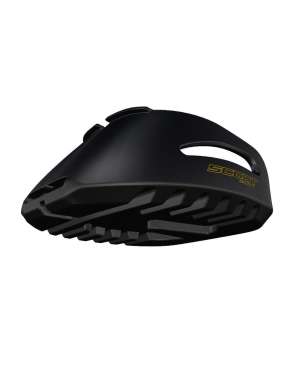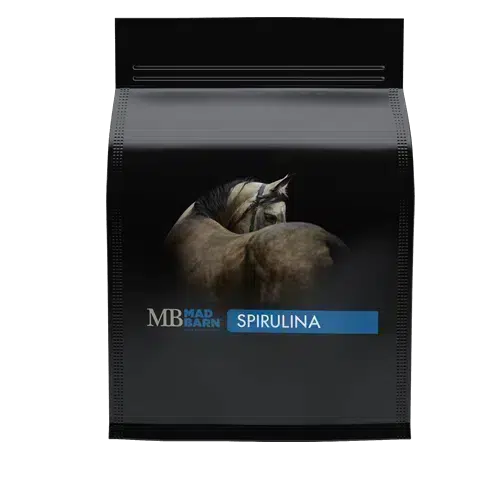
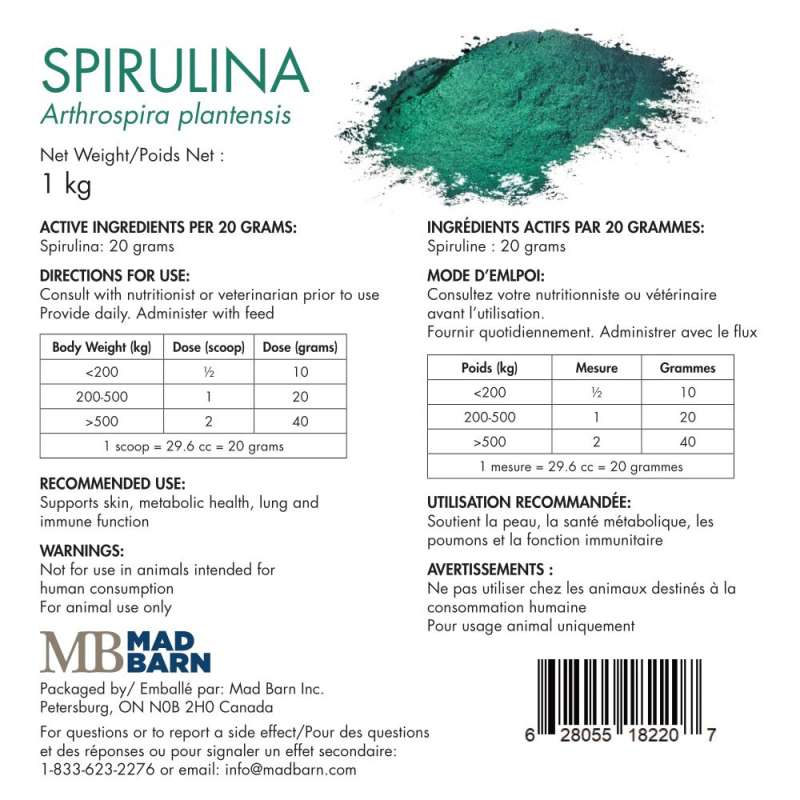
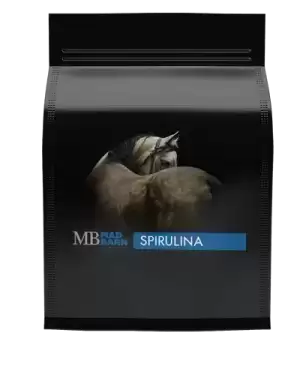
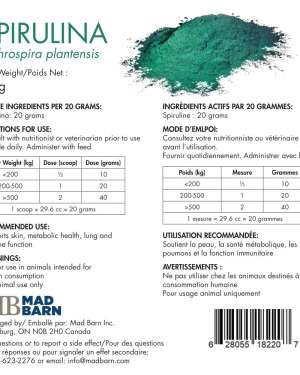
Spirulina Powder

Spirulina Powder
$44.99 – $224.95Price range: $44.99 through $224.95
$44.99 – $224.95Price range: $44.99 through $224.95
Spirulina platensis is a blue-green algae that is rich in protein, fatty acids, vitamins, and minerals. It provides nutritional support for skin, metabolic health, respiratory function and the immune system in horses. Spirulina is beneficial for horses with allergies, and horses engaging in competition and high-intensity exercise.
- Description
- Additional information
Description
 Mad Barn’s bulk Spirulina powder provides a concentrated form of blue-green algae to support your horse’s immune function and nutritional needs.
Mad Barn’s bulk Spirulina powder provides a concentrated form of blue-green algae to support your horse’s immune function and nutritional needs.
Spirulina is commonly referred to as an algae, but it is actually a naturally occurring bacteria that grows in saltwater and freshwater worldwide. Spirulina powder consists of two cyanobacterial species named Arthrospira platensis and Arthrospira maxima.
Spirulina is a nutritionally dense supplement that is easily digested. It is an excellent source of vitamins and minerals to support overall health and well-being of horses.
It is especially high in vitamin A and vitamin E which are important anti-oxidants that neutralize free radicals in all cells of the body. Horses fed mostly hay-based diets may be deficient in several vitamins and could benefit from the abundant vitamins and minerals found in spirulina.
This supplement is a rich source of the fatty acid gamma linolenic acid (GLA) . GLA is an anti-inflammatory omega-6 fatty acid. It has been shown to promote health benefits in humans including wound healing and tissue repair as well as exhibiting anti-bacterial and anti-viral effects. [1]
Spirulina powder is especially high in protein (up to 70%) and is considered a complete protein. This equine supplement might be particularly beneficial for young animals and heavily exercised horses to support their high protein needs. Although it provides all essential amino acids, it is considered low in lysine and methionine.
Horses affected by any of the following might benefit from spirulina supplementation:
- Have frequent immune challenges related to training, transportation and competition
- Slow recovery from exercise including tying up (exertional rhadomyolysis) and slow respiratory recovery
- Recurrent respiratory issues like heaves/COPD, chronic cough, sneezing, nasal discharge
- Prone to respiratory allergic reactions to dust or pollen
- Prone to skin conditions like sweet itch, an allergic reaction to insect bites from Culcoides (midges)
- Poor metabolic health (easy keepers) that have high body condition scores with abnormal fat deposits like cresty neck
- Equine Metabolic Syndrome – signs of this include frequent urination and drinking, obesity, and laminitis
Anecdotal reports suggest spirulina powder can support respiratory function in horses. Inflammatory airway disease commonly occurs in high performance horses but medications like clenbuterol and corticosteroids are prohibited in competition.
Dr. Kellon reports on three cases in which a combination of spirulina platensis (20 grams given twice per day) and jiaogulan powder (2 grams given twice per day) improved respiratory function in performance horses with recurrent respiratory issues. Symptoms such as low energy and fatigue, chronic cough, sneezing, head shaking, nasal discharge and respiratory recovery were improved in the three horses studied. [2]
In another case report, three months of spirulina supplementation was shown to support improved metabolic health and weight loss in horses with equine metabolic syndrome.
Horses were fed 500 g per day of a commercial feed containing Spirulina platensis. At the end of the three months, horses had diminished cresty neck scores, lower fasting insulin levels and improved glucose tolerance. These benefits were attributed to the anti-inflammatory and anti-oxidant effects of phycocyanin – a selenium-rich protein found in spirulina. [3]
The feeding rate for spirulina varies depending on your horse’s condition and current diet. A typical serving size is 20 grams given twice a day for a 500 kg horse. Some horses may be hesitant to consume spirulina powder due to its unique smell. Combining it with Mad Barn’s W-3 oil essential fatty acid supplement may help mask the smell for picky eaters.
Spirulina is Generally Recognized as Safe by the US Food and Drug Administration. It grows best in lakes with very high pH which is not a favourable environment for many other microbes. Therefore, there is low risk of contamination with other microorganisms.
You should always consult a qualified nutritionist before altering your feed program.
REFERENCES
- Roughan, Grattan P.Spirulina: A source of dietary gamma-linolenic acid? J Sci Food Agri. 1989.
- Kellon, Eleanor Use of the Herb Gynostemma Pentaphyllum and the Blue-green Algae Spirulina Platensis in Horses . Equine Congress
- Nawrocka, Daria et al. Spirulina platensis Improves Mitochondrial Function Impaired by Elevated Oxidative Stress in Adipose-Derived Mesenchymal Stromal Cells (ASCs) and Intestinal Epithelial Cells (IECs), and Enhances Insulin Sensitivity in Equine Metabolic Syndrome (EMS) Horses. Marine Drugs .2017.
- Mittelman, N.S. et al. Presumptive Iatrogenic Microcystin?Associated Liver Failure and Encephalopathy in a Holsteiner Gelding . J Vet Intern Med .2016.
- Roy-Lachapelle, Audrey et al. Detection of Cyanotoxins in AlgaeDietary Supplements Toxins. 2017.
Additional information
| Size | 1kg, 2kg, 5kg |
|---|



